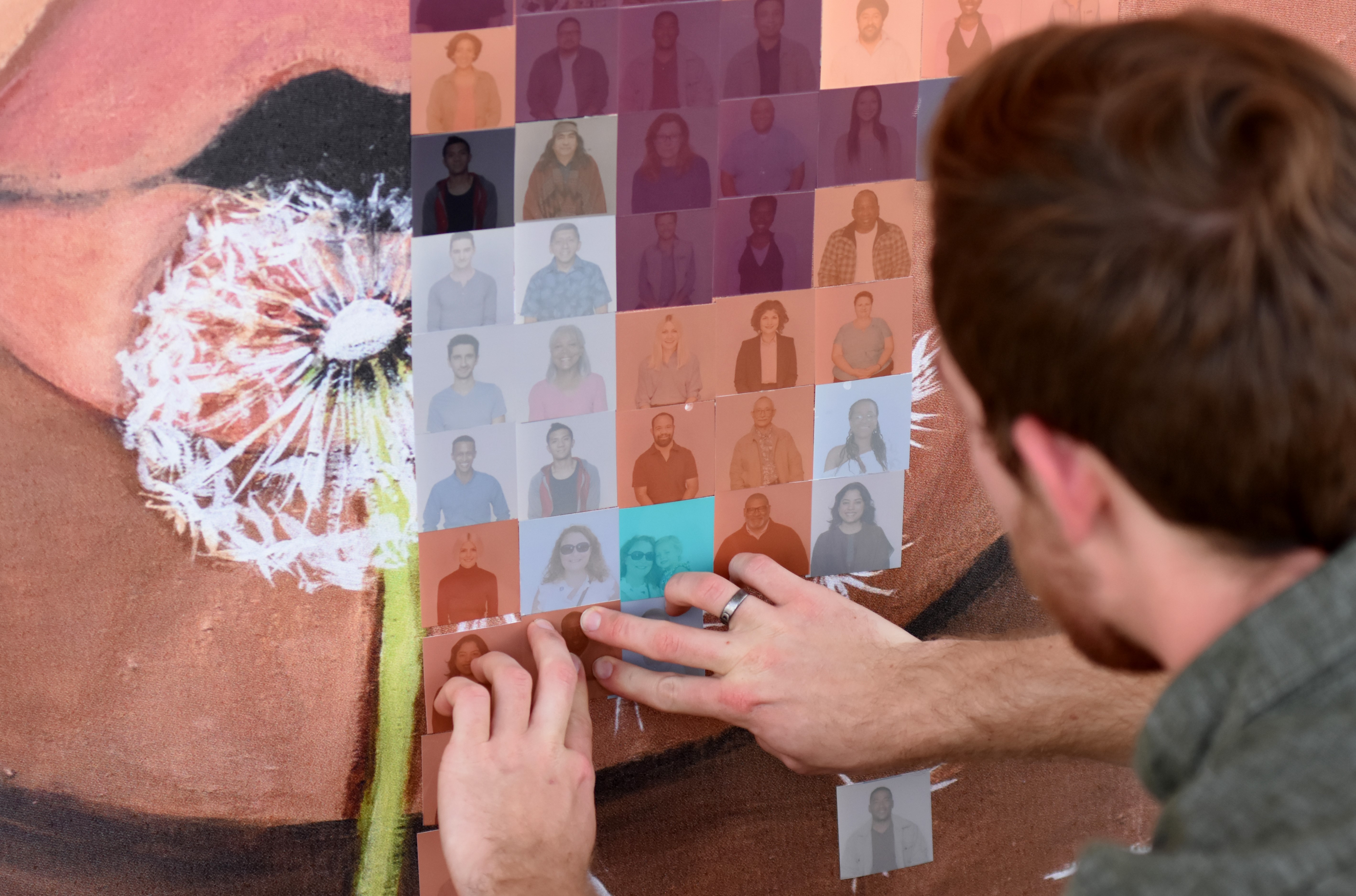
By Solomon Crenshaw Jr.
For the Birmingham Times
Hundreds of people took turns posing for instant photos of themselves on a Sunday afternoon at downtown Birmingham’s Railroad Park. And artists used the snapshots to build a mosaic on half of the face of a girl blowing a dandelion.
“I named her ‘Addie Cecilia,’ which is a combination of the names of the four little girls killed in the [1963] Sixteenth Street Baptist Church bombing,” said artist Liz Landgren, referring to Addie Mae Collins, Denise McNair, Carole Robertson, and Cynthia Wesley.
Half of the finished work will be Landgren’s painting. The other half will be the mosaic created from the combined snapshots. The total image is the essence of the All of Us Research Program, a National Institutes of Health (NIH) effort to enroll a million people across the U.S. to help discover links to disease prevention and incorporate precision medicine into the healthcare process.
Data collected from those who sign up for the project could solve some of the health challenges that have puzzled doctors. All of Us launched May 6 at locations across the country, including Birmingham.
“The key part of this, as we sequence the genome of individuals, is not about what we find now,” said Selwyn Vickers, MD, senior vice president and dean of the University of Alabama at Birmingham (UAB) School of Medicine. “It’s about what we find in the next five years that can impact your life.”
A genome is an organism’s complete set of DNA, including all of its genes. Each genome contains all the information needed to build and maintain that organism. In humans, a copy of the entire genome—more than three billion DNA base pairs—is contained in all cells that have a nucleus.
As Vickers put it, the puzzle could come together years from now.
“We might sequence your genome and not know much right now because we haven’t put X and Y together. Five years from now, we could call you back and say, ‘We see you have gene B and gene C. We didn’t know what it meant five years ago, but we know it means something now. It’s having an impact on the future of healthcare.’”
Power of Genomics
Bruce R. Korf, MD, PhD, the chief genomics doctor at UAB, said the idea is not to treat people as averages when they seek health care: “You don’t want to be the average patient. You want your provider to tailor prevention and management of disease to you and your specific needs.”
“Right now, we have the tools to begin to learn that, but we have a long way to go before we can make sense of what really makes us all unique individuals,” Korf said. “The All of Us program is our effort to harness the power of genomics, of informatics, of new technologies to really answer the question of what defines individuality and how healthcare can be tailored accordingly.”
Vickers has identified the idea of precision medicine and genomic medicine as a central theme for UAB, which is the coordinating center of the All of Us project for the southern U.S.
During the Railroad Park event, UAB President Ray Watts, MD, said the institution is leading the effort to sequence the genome of 10,000 Alabamians from every county.
“All of Us will be at the vanguard of precision medicine,” he said. “This will create one of the largest and most diverse databases for health research. All of Us can make a tremendous difference in the future of not only Americans but those around the world.”
By Far the Biggest
UAB has launched other initiatives, including the Alabama Genomic Health Initiative, but All of Us is by far the biggest.
Korf said, “For [Vickers], this has been a kind of signature effort, a chance to have UAB really be a national leader.”
Vickers said, “I believe this effort has the opportunity to transform health care in America, but most importantly in Birmingham and in the Deep South. We believe that as an institution in the Deep South with significant research interest, [UAB] has the responsibility as well as a unique opportunity to lead our country.”
Birmingham’s rankings are high in the worst aspects of health care, including hypertension, cardiac disease, and diabetes.
“We believe that understanding our genome, our makeup, and our environment will have a huge impact on these outcomes,” Vickers said. “And there’s no better place to do that than in Birmingham and the rest of the Deep South.”
National Scale
The All of Us Research Project launch was a national event simulcast from various locations.
“UAB puts Birmingham on the map on a national scale,” Vickers said, noting acknowledgment from NIH Director Francis Collins, MD, PhD. “When he highlighted cities that are relevant for health care and relevant for science and innovation, Birmingham’s name was mentioned. He talked about Detroit. He talked about New York. He talked about Kansas City. He talked about Nashville.
“Birmingham’s name was mentioned … not because of multiple things it could have been, but because of UAB,” Vickers said. “That is what we believe is the opportunity to raise the bar of what health care means for this state and for this city.”
For more information or to participate, visit www.joinallofus.org and https://allofus.nih.gov



